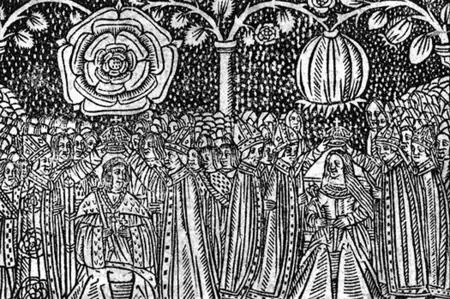
24th June, Midsummer’s Day, was the day chosen for the joint coronation of Henry VIII and his new bride Catherine of Aragon. It was a day associated with fairies and magic, and it was traditional for fires to be burned on Midsummer’s Eve to give the sun strength. David Starkey writes of how the new king and queen “seemed indeed to be another Oberon and Titania: their magic spell would knit up old wounds and end ancient hatreds, and all, all would live happily ever after.”
At 8am on the 24th June, Henry and Catherine, under canopies carried by the barons of the Cinques Ports, processed behind twenty-eight bishops from the Palace of Westminster to the Abbey for the coronation ceremony. They walked on a carpet of striped cloth which was immediately torn to bits by the excited crowd who wanted a souvenir of that special day.
In the Abbey, the Archbishop of Canterbury, William Warham, presented Henry to his people who acclaimed him by calling out “Vivat, vivat rex!“, or “Long Live the King!”, four times. When asked if they would “receive, obey and take” Henry as their King, the crowd in the Abbey all cried “Yeh! Yeh!” Henry then swore the nine oaths of kingship before Warham anointed him with holy oils and crowned him. Catherine was then crowned Queen of England and the royal party processed back to Westminster Hall for a celebration banquet. The banquet was opened by a fanfare of trumpets and special procession of dishes, led by the Duke of Buckingham and the Lord Steward, both on horseback.
The celebrations did not end with the banquet. There was a special tournament that night and then two days of jousting and feasting. It was the end of an era and the beginning of a new one, a new age, the reign of King Henry VIII who was to become one of England’s most infamous monarchs. In his “Coronation Ode of King Henry VIII”, Thomas More wrote “This day is the end of our slavery, the fount of our liberty; the end of sadness, the beginning of joy… Such a King will wipe the tears from every eye and put joy in the place of our long distress”. It was the end of an era. The Winter King was dead and there was hope for a glorious future.
You may be interested in reading the poet Stephen Hawes’ “A Joyfull Medytacyon to All Englande of the coronacyon of our moost naturall soverayne lorde kynge henry the eyght” which was written in celebration of Henry VIII’s coronation. It can be read online at archive.org.
Also on this day in history…
- 1532 or 1533 – Birth of Robert Dudley, Earl of Leicester and favourite of Elizabeth I. See 24 June – Birth of Robert Dudley, Earl of Leicester.
Notes and Sources
- Halls Chronicle, Edward Hall, p507-510
- Henry: Virtuous Prince, David Starkey, p 286-296
- Henry VIII, J J Scarisbrick, p35-36